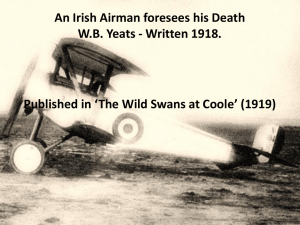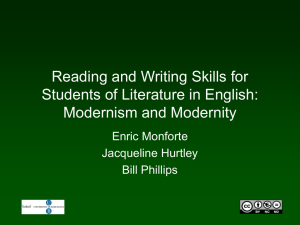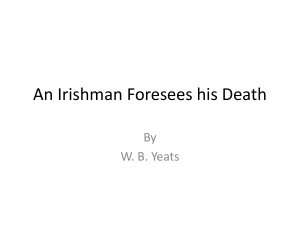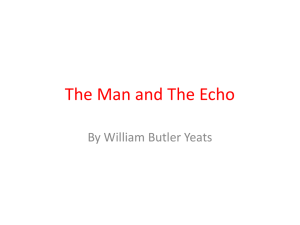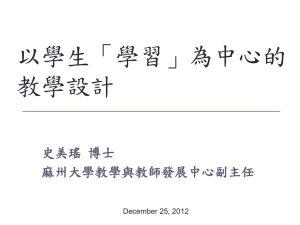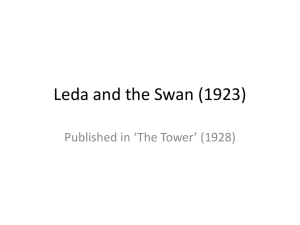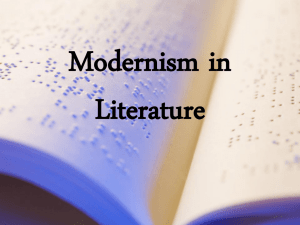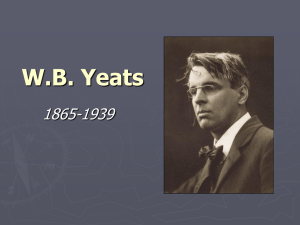Yeats: His Life and the Poems ” Down by the Salley Gargens & For
advertisement
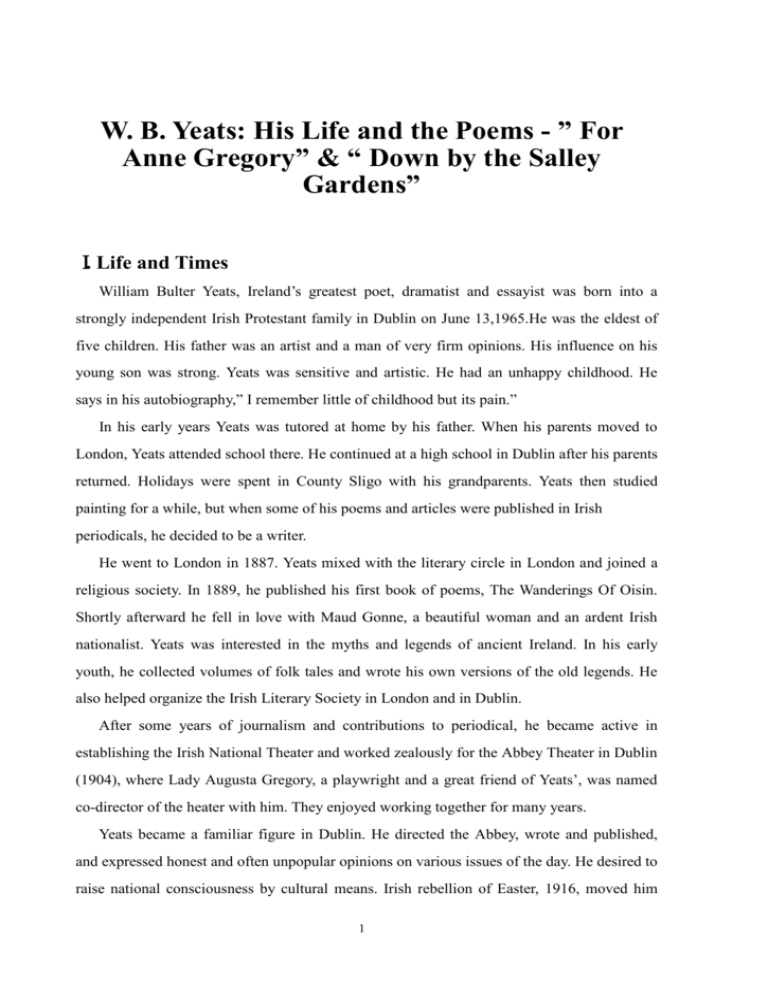
W. B. Yeats: His Life and the Poems - ” For Anne Gregory” & “ Down by the Salley Gardens” Ⅰ. Life and Times William Bulter Yeats, Ireland’s greatest poet, dramatist and essayist was born into a strongly independent Irish Protestant family in Dublin on June 13,1965.He was the eldest of five children. His father was an artist and a man of very firm opinions. His influence on his young son was strong. Yeats was sensitive and artistic. He had an unhappy childhood. He says in his autobiography,” I remember little of childhood but its pain.” In his early years Yeats was tutored at home by his father. When his parents moved to London, Yeats attended school there. He continued at a high school in Dublin after his parents returned. Holidays were spent in County Sligo with his grandparents. Yeats then studied painting for a while, but when some of his poems and articles were published in Irish periodicals, he decided to be a writer. He went to London in 1887. Yeats mixed with the literary circle in London and joined a religious society. In 1889, he published his first book of poems, The Wanderings Of Oisin. Shortly afterward he fell in love with Maud Gonne, a beautiful woman and an ardent Irish nationalist. Yeats was interested in the myths and legends of ancient Ireland. In his early youth, he collected volumes of folk tales and wrote his own versions of the old legends. He also helped organize the Irish Literary Society in London and in Dublin. After some years of journalism and contributions to periodical, he became active in establishing the Irish National Theater and worked zealously for the Abbey Theater in Dublin (1904), where Lady Augusta Gregory, a playwright and a great friend of Yeats’, was named co-director of the heater with him. They enjoyed working together for many years. Yeats became a familiar figure in Dublin. He directed the Abbey, wrote and published, and expressed honest and often unpopular opinions on various issues of the day. He desired to raise national consciousness by cultural means. Irish rebellion of Easter, 1916, moved him 1 deeply. In 1917, he married Georgie Hyde-Lees, who bore him a daughter and a son. In 1922 he became a senator of the founded Irish Free State. For six years he served as Minister of Fine Arts in the Dublin Cabinet. In 1923, Yeats received the Nobel Prize for Literature. Yeats continued to play an active role in Irish life for the following several years. In 1932, he made the last of several trips to the United States. In 1938, his health began to fail, he moved to South France. He died on January 28, 1939 and was buried near Nice. In 1948, his body was returned to Ireland and was laid to rest in Drumcilff Churchyard, near the town of Sligo. Yeats was proud, sensitive, courageous and independent as a great poet and playwright. Yeats successfully made his poetry embody the truth of his life. As if to carry this truth beyond the grave, he wrote his own famous epitaph on his tombstone. They are the last words in his Collected Poems: “ Cast a cold eye on life, on death, Horseman, pass by! ” Ⅱ.The Poem “ For Anne Gregory “ W. B. Yeats was the greatest figure in the poetry of the early part of 20th century. His work covered fifty years. Yeats’ early lyrical poetry and drama drew inspiration from Irish legend and accult learning, but his later writing became increasingly engaged with his own time. In his later work, his themes became more universal. His main subject was the way in which the world and the people in it are divided, and how they can be made a whole. The following were two poems written in his old age. The first poem is like a conversation taking place between the elderly poet and the lovely young girl, Anne Gregory, She was, in fact, the grand-daughter of Lady Gregory, Yeats’ friends and patron. FOR ANNE GREGORY Never shall a young man, Thrown into despair By those great honey-coloured Ramparts at your ear Love you for yourself alone 2 And not your yellow hair . But I can get a hair-dye And set such colour there, Brown, or black, or carrot, That young men in despair May love me for myself alone And not my yellow hair. I heard an old religious man But yesternight declare That he had found a text to prove That only God, my dear, Could love you for yourself alone And not your yellow hair . In this poem, the girl has confessed to her older friend, the poet, a common feeling of young women. She wants to be loved for her essential self, her inner nature rather than for her physical beauty. The yellow hair, in the poem, is the symbol of her external physical beauty. However, in the first stanza the poet says that young men will always fall in love because of her physical beauty. He is also saying that it is impossible for a lover to distinguish a woman’s physical qualities from her inward self. She may be able to feel a difference between “ herself alone “ and her “ yellow hair, “ but never can a young man in love make this distinction. The poet wonderfully uses the skills of “ metaphor “ and “ image “ in this stanza. The girl replies in the second stanza in a natural voice, innocent way. She argues that she will change the color of her hair, dye it some other color: “ brown, or black, or carrot. “ She supposes that if she is unattractive in appearance, young men will turn to her true inner self. Her 3 argument shows how little women understand the feeling and thoughts of men. Through the absurd argument, the poet shoes us the mystery of love and beauty. Finally, in the last stanza, Yeats gives himself the last word on the conversation. He pretends that he has talked with a person full of religious knowledge and wisdom. The religious man has found some written authority that supports Yeats’ position. Yeats is right, and the girl is mistaken. No one except God can love her alone. Young men are but flesh and blood, cannot go completely beyond flesh and blood in their love. The poet is really talking about human beings generally, and his theme is very much in the tradition of Romantic literature. His last stanza expresses the truth of our human condition. This poem is one of Yeats’ lighter pieces, a delightful dialogue between a young, lovely girl and a wise friend-obviously an older man. Though it is light and humorous, it also expresses Yeats’ constant, serious themes: the relation between physical beauty and love, and on other hand, spiritual beauty and love. In this poem, Yeats has done everything so lightly and skillfully that we hardly realize how much has gone into his poem. On the surface is just the gentle, human conversation of a young girl and an older man about the theme of love and beauty. Beneath the surface, however lies the poet’s commentary on human nature. Ⅲ. The Poem “ Down by the Sally Gardens ” The young and the old often have very different ideas about life. The young, are full of energy and ready to grasp the moment. The old, who have been made wiser by experience, are generally more cautious. Perhaps this is most true when it comes to love. Often, a young boy or girl will easily fall in love and easily fall out of love. A more mature person, will know that true love takes time to grow and that love seldom happens quickly. A more mature person also knows that love can bring not only happiness, but also sorrow and regret. But how do older people know these things? It is because they were once young also. They made their own mistakes in life and in love. So young people should listen closely to the advice that the elders give. The following poem offers some words of wisdom about falling in love too early. 4 Down by the Salley Gardens Down by the salley gardens my love and I did meet; She passed the salley gardens with little snow-white feet; She bid me take love easy, as the leaves grow on the tree; But I being young and foolish, with her would not agree. In a field by the river my love and I did stand, And on my leaning shoulder she laid her snow-white hand. She bid me take life easy, as the grass on the weirs; But I was young and foolish, and now am full of tears. In this poem, Yeats used “ parallelism “ skillfully. The first stanza and the second stanza parallel each other. “ She bid me take life easy, as the leaves grows on the tree “ parallels “ She bid me take life easy, as the grass grows on the weirs. “ Also, “ with her would not agree “ parallels “ and now am full of tears. “ Yeats arranged the words, sentences and paragraphs perfectly in the poem. At the end of the poem the narrator feels regret for having been young and foolish and is now full of tears. It is really a good advice. 5
